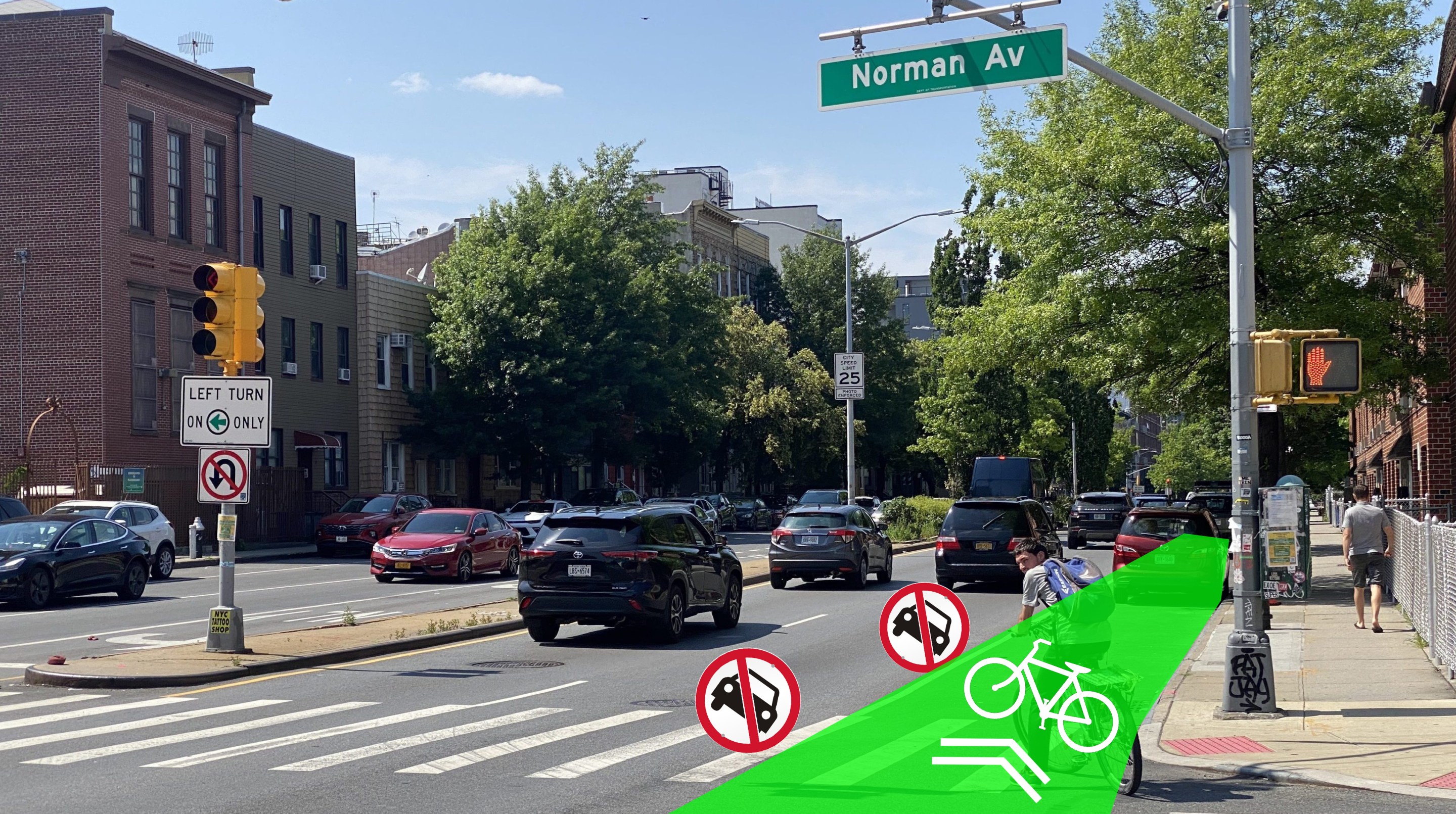My goodness McGuinness!
In a stunning reversal, the Adams administration will reduce the number of lanes on Greenpoint's McGuinness Boulevard after all — a flip-flop from the initial watering down of the street redesign that comes on the heels the mayor's indictment on federal corruption charges.
The Department of Transportation will reduce the travel lanes of the highway-like boulevard from four to two this fall between Calyer Street and Meeker Avenue.
The change came less than two months after DOT announced it would keep the lanes intact, as it had on the similarly scaled-back redesign of the northern section of the roadway between Calyer Street and the Pulaski Bridge.
Local advocates and elected officials — who had slammed the scaled back redesign for doing "nothing" for pedestrians — were thrilled by the return to the road diet.
"I’m just really grateful to the better angels of the Adams administration for coming back with this," Assembly Member Emily Gallagher told Streetsblog, paraphrasing no less an authority on battles than Abraham Lincoln. "I’m grateful to the advocates who never gave up."
The pro-redesign group Make McGuinness Safe vowed to keep advocating for the design all along the roadway.
"We will have a safe McGuinness, south of Calyer at least," the group said in a statement. "We will finally have a road that prioritizes safety and visibility and local use above all. And we will continue to push to extend that work north."
The news was first reported on Wednesday by the Daily News.
The dramatic shift follows federal prosecutors indicting Mayor Adams for allegedly taking bribes from foreign donors, and after the feds raided the home of several senior administration officials, including notably his chief adviser Ingrid Lewis-Martin Friday, who had worked to stop the McGuinness proposal as part of her ongoing mandate to slow down safety projects.
Advocates had for years pushed to make the corridor safe after a hit-and-run driver killed teacher Matthew Jensen there in 2021, but a concerted campaign led by the powerful Argento family that owns local film studio and Broadway Stages got the ear of Lewis-Martin to halt the life-saving upgrades.
Lewis-Martin did not immediately respond for comment.
DOT disputed that the reversal was related to the indictment, with a spokesperson saying the change came out of feedback to the agency's last McGuinness announcement in August. And a person with knowledge of the negotiations said that the reversal had been in the works prior to the indictment a week ago.
But another source told Streetsblog that the mayor's weakened status played a role.
Deputy Mayor for Operations Meera Joshi, who oversees DOT, said the agency simply adapted to the input from locals.
“I am grateful to DOT for its ... willingness to adapt to community and elected officials' feedback, and, of course, to New Yorkers for their candor," Joshi said in a statement forwarded by DOT. (Commissioner Ydanis Rodriguez was not quoted in the statement.)
One insider said that the change shows that the administration can still work to improve the city.
"This announcement is a good opportunity for the Adams administration that they can continue to govern the city, despite everything that’s going on," the source said.
In any event, advocates celebrated the change as a win for street safety.
Together, we kept fighting for a truly safe McGuinness Boulevard.
— Transportation Alternatives (@TransAlt) October 2, 2024
Together, we won.
Today, the City announced it will remove a car lane in each direction on the southern portion of the street, slowing traffic & protecting everyone using it.
Onward!
➡️ https://t.co/safcpUihtZ pic.twitter.com/Kp6mdOdbfI
But this guy won't be happy:

Broadway Stages spokesperson Juda Engelmayer said the company respects "the process."
"We expressed our concerns about the original road diet along with other businesses and it appears that the DOT has made its decision. We respect the process," he said in a statement.






